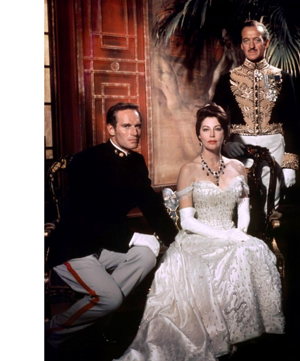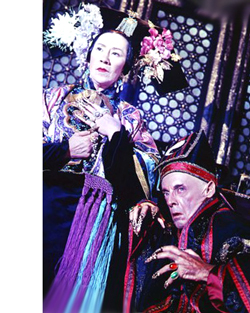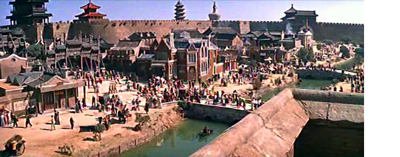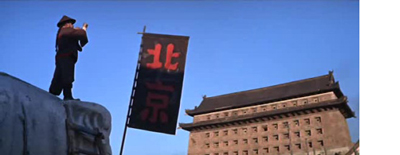
 |
|
|
|
Imagine if you will the mega-independent producer Samuel Bronston, up to his neck in major financial deals with international banks, a major American corporation and the government of Fascist Spain, trying to keep in motion the monster epics he's filming just outside Madrid. Bronston's designers have made excellent progress on the enormous sets for his upcoming spectacular The Fall of the Roman Empire, when Charlton Heston of his earlier hit El Cid suddenly becomes available. Heston has already done his Roman-era movie, but he likes another project in the works, about the 1900 Boxer Rebellion in Peking (now usually Peiping) China. No problem, decides Sam -- the Roman sets are torn down and replaced with the even larger constructions for the Chinese movie. The set is enormous, with a huge section of fortress wall, towers, pavilions, a river with four bridges and big replicas of both the Foreign Legation diplomatic area and the Forbidden City itself. When not parading his young son around the set, costumed as a Marine Corps Major just like his old man, Heston gets in another choice quote: the monster city is so big that director Nicholas Ray's cameras never film in parts of it. Heston suggests to his producer that Orson Welles be let loose with some cameras and $100,000 to make a movie in "the back acres." (Why not Revenge of The Lady From Shanghai?) 
Bronston's empire would not crash for two more pictures, but the crazy filming of 55 Days at Peking made weekly news in the trade papers. Director Nicholas Ray fell sick and didn't make it all the way through filming; by some reports he was spending more time on background details and special visual ideas than scenes needed for the narrative. Second unit specialist Andrew Marton, already responsible for all the action and big-scale crowd scenes, ended up shooting the rest of the picture, inventing new scenes of his own. Charlton Heston called the shots on occasion, and had director Guy Green come in to shoot two of his scenes with Ava Gardner. David Niven got into the act too. Deciding that his part was insufficiently macho, had an action scene invented so that his British Ambassador character could lead a commando raid on the royal armory. The other second unit director Noél Howard put that together for him. Director Marton said that he threw out scores of scenes Ray had shot, which he felt weren't needed. The production was out of control. One account claimed that anybody on the film could charge most anything they wanted to the film, just on a personal say-so. Sam Bronston's chain of command was like the tent of a warlord -- whoever waved the biggest stick got his way. 'Executive Associate Producer' Michael Waszynski and wheeler-dealer Philip Yordan were the closest to Bronston and spent enormous sums of money with hardly an accountant in sight. The money went into the movie, to be sure, with lavish sets made of authentic materials by true artisans, plus all those heavily researched costumes made of real silk. The weapons for the dozen international armed forces depicted were authentic. 1 Nobody knows what kinds of payoffs, 'donations' and 'special arrangements' took place, but Bronston's big chiefs were spending cash faster than Bronston could raise it. It's very possible that the charges of money being siphoned off were more than journalistic inventions. Bronston hadn't become a top-tier wheeler and dealer by sticking to the rulebook. 
Of all the Samuel Bronston mega-productions, only Anthony Mann's carefully managed El Cid escaped heavy criticism. Martin Scorsese helped win it a 70mm reissue in 1993. With its blue-eyed blonde Sunday school Jesus, Nicholas Ray's rather good King of Kings was razzed as "I Was a Teenage Christ". The Fall of the Roman Empire became notorious as a giant 70mm flop, a three-hour slice of history and battles lacking strong characterizations. It's far better than that; seen on a giant screen, it's the most lavish epic of the bunch. As the sage William Bayer said, grandiose movies can be pleasurable just for their grandiosity. I agree, in that the modern ability to whip up CGI epics has devalued the subgenre. When we see three and four thousand real people on the screen in Roman Empire the effect is far more impressive than the 10,000 pixel-people clashing in a Lord of the Rings CGI battle. 55 Days at Peking shares in the grandiosity of the other films -- big stars, sweeping camera work, thrilling music and recreations of enormous battles from long-gone eras. But the show sags badly where it counts the most. Bernard Gordon's basic story is lazy and unimaginative. It tells us almost nothing of the context of the Boxer Rebellion. We instead follow soap-opera subplots among the representatives of eleven foreign governments that have taken up residence in the capitol of Peking. In 1900, Major Matthew Lewis (Heston) rides into the ancient city with his top Sgt. Harry (John Ireland) and his good friend Captain Andy Marshall (Jerome Thor). Marshall is looking for his half-Chinese daughter Teresa (Lynne Sue Moon), who lives in an orphanage run by nuns. Lewis promotes a personal relationship with the Baroness Natalie Ivanoff (Ava Gardner), an adventuress who was reportedly once the consort of a Chinese General; Natalie's brother-in-law Baron Sergei (Kurt Kasnar) is furious that she has possession of the Ivanoff family heirloom, a priceless necklace. Sergei is also the Czar's Minister at the foreign legation headed by emissaries from a dozen countries. Leading them is the diplomatic Sir Arthur Robertson (David Niven) who with his wife Lady Sarah (Elizabeth Sellars) hosts the legation's formal gatherings. Each country also has a detachment of troops. The Imperial Chinese Army surrounds them, but the real threat is from the Boxers, a massive, irregular political militia that wants all foreigners out of China. The Dowager Empress Tsu-Hsi (Flora Robson) is playing a dangerous game. She too wants the Western powers to leave, as they occupy and control most of the country's territory as well as its commerce. She directs acts of Boxer terror against the Europeans through Prince Tuan (Robert Helpmann), a sinister schemer at odds with the throne's official military leader, General Jung-Lu (Leo Genn). Prince Tuan orders the assassination of the German Minister. But instead of abandoning the country Sir Arthur directs his international coalition of forces -- only 140 soldiers in all -- to defend the legation compound against the attacking Boxers. 
Unless you're a lover of giant epics (count me in) there's not a lot of love out there for 55 Days at Peking. Unable to grasp anything of substance in the historical account of the Boxer Rebellion, screenwriter Philip Yordan falls back on Cold War/colonial fundamentals: the civilized Europeans in Peking are surrounded by heathen hordes seemingly committed to irrational violence, even against their own populations. Peking is dismissed as a 'backwater' and at one point Lady Sarah, fearing her son will die on Chinese soil, anguishes that his soul will be lost in a Chinese Limbo. Flora Robson's Empress is a cold witch, playing politics with Leo Genn's dull, humorless general and Robert Helpmann's advisor, who looks like a cross between Fu Manchu and Nosferatu. 4 To 'atone' for the murder of the German delegate, the Empress stages a mass beheading for Sir Arthur -- 10 heads simultaneously. Another victim is executed not for his crimes, but because his problem 'has disturbed the tranquility of the day.' The only message we can possibly derive is that Asians have no regard whatsoever for human life. When not embroiled in soapy subplots, the screenplay constantly reinforces the virtue of international cooperation against the Chinese army of Boxer maniacs. Nationalism and militarism are exalted. John Ireland must use several languages to say 'good morning' to his comrades in arms. The fighting Father de Bearn (Harry Andrews) cobbles a makeshift cannon from pieces sourced from different countries. In the kind of simplification movie writers cherish, the discordant clash of 11 military bands ceases for the 55 days of the siege. The movie curiously wants us to side with militarism even though the Japanese and Germans are involved. For all we know, some of the younger Japanese officers here were likely future war criminals. What we do learn is that the combined military (and especially Charlton Heston's Marines) are worth fifty times their number of Chinese rabble, who die by the apparent thousands, anonymously. The few Boxers seen up close are pretty vile and not allowed a legitimate motivation for their actions. The fiendish murderer of a missionary is also a greedy clod eager to take Charlton Heston's money. Prince Tuan has some Boxer soldiers perform at Sir Arthur's gala ball, frightening the womenfolk with a sword dance seemingly choreographed in the style of the Peking Opera School. As portrayed by the specialist in weirdness Robert Helpmann, Prince Tuan is a transparent double-dealing snake, grinning through his four-inch fingernails. 2 
What's never answered is how all those colonial powers came to China and how they gained control of "6 out of 12" provinces as well as the country's commerce and banks. 55 Days at Peking assumes that they have a right to be there. At one point the American Minister (director Nicholas Ray) declares that the U.S. has no territorial claims on China. But American gunboats will be patrolling Chinese rivers right up until the outbreak of WW2. Remember the old Pat O'Brien movie Oil For the Lamps of China, the one that claims that U.S. companies' efforts to monopolize Chinese oil production is all for the benefit of the Chinese? Never mind, for the gallant siege-ordeal in Peking is taken as an honorable last stand, just because it's one of those impossible challenges that Great White Colonials accept in stride. But for bigger-than-life thrills, 55 Days at Peking frequently delivers the goods. As much as we like Nicholas Ray, little or nothing of his personal stamp remains on the film. A couple of photogenic down-angle compositions remind us of King of Kings. Some of the direction is haphazard but the picture also impresses with dazzling images: the pageantry in and around the Empress's court, the masses of sword-wielding Boxers charging sandbag walls manned by only a handful of soldiers. Night battles with rockets look like fireworks displays. The Marines push the Boxers from a large-scale legation wall several stories high, with the bodies of the slain being blown in all directions. The Chinese die in waves, falling like rag dolls and crushed by their own collapsing war machines; the defenders that receive wounds are given preferential respect. For most of the fighting, we don't understand why the Chinese don't easily overwhelm the legation soldiers. The movie gets around this by having Heston vocalize the same question out loud. 3 But the scale of the fighting is impressive in itself. Action director Andrew Marton gets to play with entire armies. Adding the night raid on the armory gives the film one too many big battles, so that the final confrontation unfortunately has an, "Is it over yet?" feeling. Marton re-shot a lot of Ray's work, and what remains are straightforward dialogue exchanges that betray little finesse. He didn't like Ray's deathbed scene for the Baroness. As Samuel Bronston biographer Mel Martin tells me, Bernard Gordon reported that, "Ava Gardner was such a pain on the set they wrote her out early with a hastily written scene... The Baroness makes a quick exit when Paul Lukas pulls a sheet over her head. Bernie told me it was sloppy, but she needed to go." The death is played on the reaction of actor Paul Lukas. 
Star Charlton Heston is in great form here; he seems to have been born to play wide-shouldered men of destiny that achieve greatness fighting in uniform. There's nothing remarkable about Heston's performance but his star persona holds things together without breaking a sweat, no matter how sloppy events get in the film's third act. In its final fragmented form 55 Days throws five subplots into the air and resolves them in the most pedestrian way. Ava Gardner's cynical Baronness experiences an unmotivated transformation into a selfless nurse, donating her necklace for needed drugs for injured orphans, etc. She's supposed to have had an affair with David Niven's Sir Arthur (probably at Niven's insistence) but that only amounts to a couple of knowing looks. And the film blows an opportunity by not making Leo Genn's General into the Baroness's secret Chinese lover. Would that be too mixed-race for the censors? In the mushy last act her character seemingly succumbs to a terribly written inspirational speech by medico Paul Lukas. Back at The Empress's regal hangout, the court intrigues just dissolve -- we don't know what becomes of Prince Tuan or General Jung-Lu. We are forced to sit through six minutes or so involving the wounding of a random young soldier. The screenwriters use him to give the Baroness someone to comfort in the hospital, and then to accuse Major Lewis of abandoning her. I guess nobody wanted to write or perform any more scenes between the film's supposed romantic leads. One bald but beautifully handled cliché is the subplot with Capt. Marshall's daughter, Teresa. Lynne Sue Moon is heartbreaking in every scene, even when the editors overstate Sgt. Harry's role as Major Lewis's conscience as regards her future. As it's the film's one successful emotional relationship, I tend without evidence to attribute it to Nicholas Ray, perhaps just in sympathy for the sensitive relationships he expressed in so many other films. When Heston reaches out to Teresa, the film momentarily becomes fully alive. We don't think about the fact that the 'white conqueror comforts native child' motif is so often abused in movies like the later The Green Berets. Much of that emotional rush is due Dimitri Tiomkin's music score, which executes a beauty of a segue between musical themes at moment of the Major's acceptance. As was his gift, Tiomkin's music binds the film's disparate elements into an almost cohesive whole. The road show cut of the picture shows Tiomkin doing his utmost to deliver commercial music as well -- the walk-out cue is a vocal of the film's theme So Little Time, sung by 1963's romantic go-to balladeer Andy Williams. Fun, good and awkward details in 55 Days at Peking: Watch actor Walter Gotell, a German officer, try to keep in step during the dances at Sir Arthur's ball. He really tries; perhaps the rehearsals were inadequate. Since the movie was filmed in Spain, Bronston reportedly had to import Chinese from all over Europe to play extras. Spaniards play Boxers in long shot, and are likely encouraged to grimace so as to be less identifiable. Many of the women at the ball seem to be local Spanish ladies, probably connected to the production. "Sí Señor Bronston, your horses will be delivered on time for filming... and when do my wife and daughters come in for costume fittings?"
The Bronston sets were so big they spilled into other movies. In Battle of the Bulge there is a quick shot of the Fall of the Roman Empire set seen fleetingly over a hill. If you examine photos of the full set for 55 Days, it's interesting that areas and buildings have been designed for specific scenes, yet all jammed closer together than they appear in the movie. Like Disneyland, they aren't quite as big
Anchor Bay UK's Region B Blu-ray of 55 Days at Peking is a very good encoding sourced from a 2013 restoration. We saw a somewhat faded 70mm print at the American Cinematheque a few years back and this looks much better. It comes complete with long overture, intermission and exit music. The clean image has vivid colors, even if some scenes appear on the weak side, with the density perhaps a bit light. The disc is a plain-wrap offering, with only an unenlightening restoration demonstration comparing scans of two elements. I recommend Bernard Eisenschitz's biography of Nicholas Ray as excellent reading on the film; I've also read comments by Philip Yordan, writer Bernard Gordon and even some remarks by an additional writer. A number of lucky creative personnel turned Samuel Bronston's film machine into a source of easy riches -- we wonder if some of these people were able to get their own film productions going with loose change spilling from the Bronston coffers. Anchor Bay UK's disc of 55 Days at Peking is yet another classic offering available only in Region B. The price can't be beat, that's for sure -- and they didn't waste any big expense on the cover art. I suppose a Region A domestic release could turn up at any moment, a possibility that multi-region U.S. fans always have to take into account.
On a scale of Excellent, Good, Fair, and Poor,
55 Days at Peking Region B Blu-ray Footnotes:
1. Here's a page that details the specific guns pictured in the movie!
2. One of the Boxer performers, Siu Tin Yuen, is reportedly a noted martial arts film star. 5 The sword bearer who gets a sword poked in his gut is familiar actor Milton Reid, an Anglo-Indian familiar from Hammer horrors and spy films, almost always as an Asian bogeyman. 
3. I'm told that new Marine Corps trench shotguns with pump action had a lot to do with stopping waves of Chinese armed with swords and spears. Accounts of the 4. This of course brings up the Yellowface issue, which I understand makes 55 Days unacceptable to a large swath of today's audience. The 19th century stage makeup tricks to make Anglo eyes look Asian seem natural to people like me, raised on stereotypes that should have gone out with exaggerated blackface makeup. Discounting Blake Edwards' lousy taste in Breakfast at Tiffany's, the English were about ten years behind us in realizing that Asians don't all look alike -- in the 1960s Bert Kwouk was seemingly the only Asian actor on the Equity books. Every speaking role of consequence in 55 is played by an English actor, doing rather well with a style that belongs in The Mikado. The great Flora Robson is always impressive. But think of it -- this movie about China and a Chinese historical event has not one full Chinese characterization. We see the royals only during pronouncements from the throne. Some of the Empress's little speeches sound as if they were borrowed from fortune cookies.
Unlike me, my children were brought up on Jackie Chan movies and had to read subtitles - to them Chinese people aren't 'exotic' or strange or part of a Cold War 'other'. They understand what 1963 movies were like but 55's Yellowface characters still fall into the historically unacceptable category. 5. Correspondent Ian Whittle has the answer: Hello Glenn! You asked if "one of the Boxer performers, Siu Tin Yuen, is reportedly a noted martial arts film star." Yuen Siu Tien (AKA Simon Yuen) was a regular heavy throughout most of his career, and can be seen popping up in various 60s martial arts films. He became a star in 1978 after playing Jackie Chan's master in Snake In The Eagle's Shadow and Drunken Master, and practically worked himself to death by the end of the following year, appearing in over a dozen kung fu quickies. By the time of 1979's The World of Drunken Master, he only filmed the opening credits, where he can barely stand, and was replaced by a different actor for the remainder of the film. His sons include Yuen Woo-Ping, Yuen Cheung Yan, Yuen Shun Yi and Yuen Yat Chor -- all of whom became popular performers and film-makers in HK cinema, and would work on Hollywood movies such as The Matrix.
There is a HK film, The Boxer Rebellion that was made in 1975, and is directed by the noted director Chang Cheh - it stars Alexander Fu Sheng and Richard Harrison. It was remastered in HK and I believe the US dvd rights are stuck with Weinstein's Shaw holdings. All the best, Ian

The version of this review on the Savant main site has additional images, footnotes and credits information, and may be updated and annotated with reader input and graphics.
Review Staff | About DVD Talk | Newsletter Subscribe | Join DVD Talk Forum |
| ||||||||||||||||||